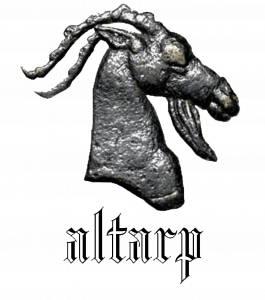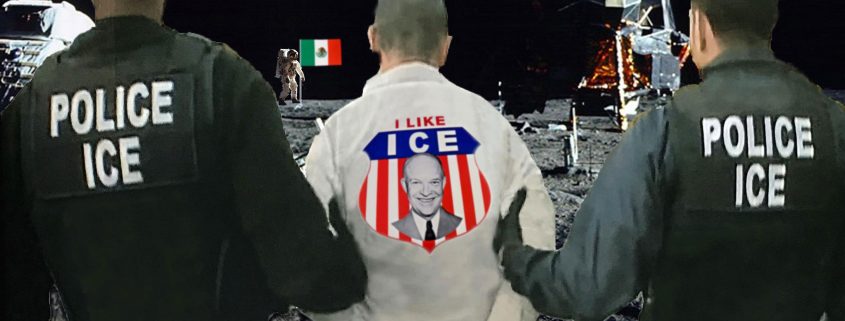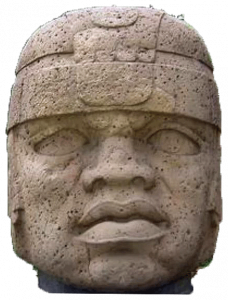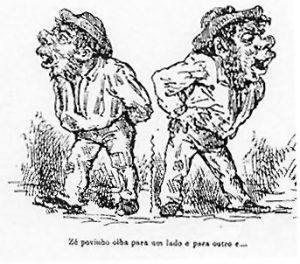Illegal Immigration and the End of Prosperity
Introduction
Illegal immigration is aggression, a home invasion on a larger scale.
But clearly the motives of most illegal immigrants are not those of home invaders. Or are they? More about this later.
But the central question of this discussion is this: Will illegal immigration cause an end to American prosperity?
The answer is YES, but not for the reason you may imagine.
NOTE: This discussion is about illegal immigration. It assumes that people of goodwill, working for a common cause, can eventually devise a system of legal immigration that systematically adds to our economic social capital. If we are unable to decide what kind of immigrant can add to our social capital, then immigration and a borderless state will be our downfall.
Contentious Issue
One of the most contentious issues facing the United States on the 4th of July, 2019 is illegal immigration. Congress seems paralyzed in the face of hords of immigrants crossing our southern border. Why can’t Congress pass a law to fix what is increasingly being recognized as a crisis?
The simple answer is that there is no agreement about immigration policy. The political Left advocates for open borders and free immigration; the Right pushes for changing the laws to prevent the incentives that promote illegal immigration. Most agree that legal immigration is not only desirable, but essential to our economy.
Claims about the economic value of immigration vary widely, primarily because the economy is another point of contention between the Right and the Left. America’s favorite Ponzi scheme, Social Security needs more workers to support it. Microsoft wants programmers from India via the H-1B visa program, and healthcare pushes for increases in nurses admitted on H-1A visas. Farmers used to want guest workers until that program flopped and the farms got bought up by international corporations. Now the guest workers are old and their children and grandchildren are proud Americans who shop at Walmart and pay sales taxes.
We are told that Americans don’t want to work in the harvest. Maybe the wages are too low, or maybe there are enough underpaid immigrants entering the country illegally to fill the demand.
Illegal Immigration and the End of Prosperity
Our title is intentionally provocative. It is intended to draw attention to an overlooked aspect of economic growth. The people of a country, collectively, determine the type of economy and degree of prosperity of the country. A nation of poorly educated people divided by tribalism will remain poor for generations. Such a country is destined to be ruled by elite dictators.
A nation of well-educated people sharing a high degree of cooperative effort is likely to choose a government that helps promote their common interests . Such a nation is likely to enjoy a high standard of living, and will tend to maintain that standard throughout subsequent generations by promoting the educational and ethical standards that fostered it in the first place. Philosophers have dubbed such a nation an open society although as with any concept, there are those who interpret the term to suit their own ends.
Americas Are Lands of Immigrants
The United States and the all of the Americas are lands filled with immigrants. It’s just a question of when they arrived. The ancestors of Native Americans arrived at various times, possibly as long as 30,000 years ago, and in various waves until about 10,000 years ago. Archeology does not tell us very much about the wars that must have occurred anciently as one wave overran another. Mesoamerica offers some clues but that record goes back only to about 2500 BCE, and really only dates from the mysterious so-called Olmec culture about 1600 BCE. Did the Olmecs simply, and peacefully, evolve into the Maya culture, or did they disappear through genocide or natural disaster?
European Invasion
Beginning in 1492, European nations began their competitive colonization of the Americas. England ended up with most of North America except what is now Mexico. She also got a few islands in the Caribbean, the Falkland Islands off the coast of Argentina, and British Honduras in Central America. Spain and Portugal got most of the rest. Holland still has a toehold that makes a nice place for European tourists.
In an early demonstration of low trust societies, Spain and Portugal entered into the Treaty of Tordesillas, supposedly sanctioned by the Pope (but not really) to divide the new territory, only to be followed by numerous subsequent treaties in recognition that everybody was cheating.
The present languages of the Americas reflect that early immigration. Their religions also reflect the dominant religions of the earlier home countries. For many years the U.S was predominantly protestant, while from Mexico and south were Catholic. Much of that is changing now.
Most counties in the Americas have growing economies with the notable exceptions of countries that dabble in socialism, or frankly embrace it. Socialism stands out as an impediment to a growing economy.
U.S. and Brazilian Economies
What accounts for the difference between the United States economy and the Brazilian economy?
There is a joke that Brazilians tell on themselves:
A certain citizen had the following conversation with the Supreme Being during the creation of the world.
– Lord, You created the world and the countries, and in them you put earthquakes, tempests, tornadoes, and even deserts.
– That’s true, my son.
– All well and good! But in Brazil You put green forests, a marvelous ocean with fresh breezes and rivers with clear water. All of nature in Brazil is beautiful and tranquil.
– That is true, my son.
– <mild Brazilian expletive!> Lord, that doesn’t seem fair to me!
– Relax my son; I haven’t finished my work yet. Just wait to see the povinho that I’m putting there!
We didn’t translate povinho because it’s one of those wonderful Brazilian words that defy translation into one word within the context of the story. It also is part of a history of Brazilian self-deprecation, admiration of simple people, and acquiescence to corruption as a fact of life. Look up Zé Povinho.
So to answer the question, “What accounts for the difference between the United States economy and the Brazilian economy?”
Corruption…
Language and Culture?
Dominant religion?
Brazilians readily admit to corruption. But where did the corruption come from? In Brazil, it is difficult to trust anyone without getting to know them for a long time. The same is true in southern Italy. And China…
Corruption has been part of Brazil’s cultural landscape for years. People joke that justice can be had by buying a judge. Corruption in Brazil even has its own Wikipedia page, but so does the U.S. Most folks in Brazil complain about corruption, Idealistic young people demonstrate against it. Yet, it is so endemic that as the young people mature, most simply go along with the system. And when they emigrate to the U.S. they bring their skepticism and distrust with them. Nevertheless, Brazilians, as a nationality, demonstrate an amazing ability to assimilate into American life, especially those who immigrate legally. The rest live on the fringes looking over their shoulders and struggling to find legal employment.
Other South American Countries
The easiest way to gauge other countries’ current level of corruption and distrust in a society is to check their rankings on the Transparency International Website.
Francis Fukuyama Explains It.
In his seminal 1995 book, Trust: The Social Virtues and the Creation of Prosperity, Francis Fukuyama picks up where Adam Smith in his An Inquiry into the Nature and Causes of the Wealth of Nations left off and subsequent economists have generally passed over.
Adam Smith taught that wealth is produced when government is limited and stays out of the way of enterprising free citizens. It is an enduring argument that may account for most economic achievement. But Smith also recognized that economic life is dependent on the morals of society. Yet Smith did ascribe to any clear system of religious morality; he was critical of both Christianity and Judaism. Wealth of Nations is not about economics. It’s more about political philosophy, which seeks to explore ethics, and ethics and trust are linked inextricably.
The word trust occurs at least 20 times in Wealth of Nations but Smith does not dwell on it; he seems to take it for granted that people who are trustworthy will enjoy the extension of credit increased commerce, and ultimately wealth. Smith was not an economist. His Theory of Moral Sentiments is the work of a philosopher. In it he tries to describe natural principles that govern morality and how people attain. Fukuyama gives a clearer picture of how people become trustworthy.
Fukuyama stresses the importance of cultural factors in economic growth, including the degree of trust that exists in the society.
“Trust is the expectation that arises within a community of regular, honest, and cooperative behavior, based on commonly shared norms, on the part of other members of that community … Social capital is a capability that arises from the prevalence of trust in a society or in certain parts of it. It can be embodied in the smallest and most basic social group, the family, as well as the largest of all groups, the nation, and in all the other groups in between. Social capital differs from other forms of human capital insofar as it is usually created and transmitted through cultural mechanisms like religion, tradition, or historical habit.” Fukuyama, F. Trust: Social Virtues and the Creation of Prosperity. (Simon and Schuster, 1996): 26.
Read the above quotation again and let it sink in.
How to get Social Capital
There exists some disagreement among social scientists whether attainment of social capital is a conscious decision or if it happens as a consequence of activities outside the economic sphere. Fukuyama believes that “all cultures seek to constrain the raw selfishness of human nature in some fashion through the establishment of unwritten moral rules.” (p.35) The degree to which society as a whole acquires these values depends on how each individual acquires them. It is not hard to imagine how these values can be taught by example within a family, with reinforcement from society (schools and churches) as children grow to be adults and enter the work force. It would be necessary for these values to have the character of habits: honesty, loyalty, and dependability. These are qualities that employers value highly and lead to job stability. They are habits acquired through language, religion, education, and cultural reinforcement.
“Social capital, which is practiced as a matter of arational habit and has its origins in “irrational” phenomena like religion and traditional ethics, would appear to be necessary to permit the proper functioning of rational modern economic and political institutions – a fact that has interesting implications for the nature of the modernization process as a whole.” (Ibid p.325)
Which Are High and Low Trust Societies
Fukuyama explores the development and expression of trust in different countries, grouping them into high-trust and low-trust categories. It is not hard to guess which countries fall into which category. Any businessman doing business internationally knows the difference.
High Trust
Japan – Keiretsu – High Trust Integration of Businesses
The size of the Japan’s individual corporate entities is a bit misleading because the Japanese are masters at business relationships, which require incredibly high trust. Keiretsu is the system whereby industries share capital and technology.
Japan has formed huge corporations that dominate world commerce: Toyota (167.2 Billion USD); SoftBank Group; Nippon T&T; NTT Docomo; Keyence Corporation; Sony; Fast Retailing Co.; Mitsubishi UFJ Financial; KDDI Corporation; and Recruit Holdings. These are the top ten (by capitalization) There are many more, with more famous names. Value Today has 144 Japanese companies on their list.
German Giants
“The German economy is Fukuyama’s second example of a high trust society that has built giant corporations.
Among the huge corporations are: SAP SE (166.29 Billion USB); Linde AG; Allianz SE; Siemens AG; Volkswagen AG; DT. Telekom AG; BASF SE; Bayer AG; Adidas AG; and Daimler AG. (271 on the Value Today List)
United States Dwarfing all Others
Fukuyama devotes a whole Section (IV) of his book to the United States, which he titles, “American Society and the Crisis of Trust.”
Obviously the U.S dominates the world of large corporations. Value Today currently lists 1798 of them. This number is misleading because many of the companies are U.S. Companies with predominantly foreign operations that have listed on U.S. stock exchanges. As listed companies they publish audited financial statements that greatly increase transparency and trust. Many foreign companies sell their stock in the U.S, because it is seen a place where capital flows more freely, also a characteristic of trust.
But even back in the 1990’s when he wrote the book, Fukuyama was aware of changes coming to the American nation. Now in 2019, his vision is even clearer to all of us.
“From school boards enlarging curricula to include the study of non-Western languages and cultures, to corporations staging ‘diversity training’ seminars to sensitize their employees to subtle forms of discrimination, Americans in the 1990s have become preoccupied-pro and con- with the issue of ‘multiculturalism’.” (p. 269) “Under these circumstances, it may seem odd to sound an alarm, however modest, about the economic consequences of a decline in American social capital.” (p.321)
Low Trust
Fukuyama’s short list of low trust societies includes China and some parts of Italy, which place high regard on loyalty to family. Others on his low trust list are Korea and France. When considering the state of national economies in the early part of the 20th century, most of Asia, Africa, South America, Southern Europe, and the Middle East can be added to the low trust list. Decide for yourself where Russia belongs. Is it a nation where people trust each other? Is it run by a dictator propped up by oligarchs?
Do you personally know Russians who have immigrated to the United States? The first generation still carries the scars of living in the communist USSR. Pay attention to their spontaneous level of trust.
The wealth of a nation is not among the criteria that define low/high trust, although high trust nations are wealthier, and high trust regions within nations are wealthier. France is a wealthy European nation but it, along with southern Italy have built prosperity around family enterprises rather that more widely held corporate entities.
The Israeli Dichotomy
A visual depiction of high and low trust resulting in prosperity and poverty is obvious when one travels around Israel.
Without delving into the substantial cultural and religious differences, nor confronting claims of political exploitation of one group over another, the Jewish state has become an oasis of technical innovation in a sea of impoverished nations run by monarchs and dictators.
Refugees from the turmoil of the Middle East pouring into Europe will have long-lasting consequences for the countries that are so generously welcoming them into their midst. Hopefully the dominant culture of Germany is strong enough to assimilate the refugees. Historians will write that story several hundred years from now.
Decline of Trust – Increase in Tribalism
When a nation allows large numbers of people to immigrate, whether legally of not, that nation is importing the cultural and moral orientation of all those people. Go to any city where there are large numbers of immigrants and you will see the changes. The first generation of immigrants likes to associate with others from their homeland. To some degree the children of those immigrants identify with their parents, but inevitably they lose the language skills of their parents. By the third generation, most of the children have assimilated to some degree with only a small affinity for their grandparents’ countries of origin. While assimilating into the culture of their new country, they have lost most of their parents’ and grandparents’ culture but have gained little of the shared understanding, values, trust, or cooperation of their new country’s older generations.
Interstate Migration
Migration between the states in the United States is legal and guaranteed under the Constitution. It is a microcosm of illegal immigration. The states receiving the new people into their midst do not get to choose what type of people they get.
Although John Steinbeck did not write Grapes of Wrath as a documentary, he correctly describes the effects on both migrants and society when large numbers of poor, often uneducated, people invaded California from the middle of the country that had become a dust bowl. The tragedy of Grapes of Wrath, is not the long lasting effects the migration had on California, which had its own economic struggles. The migrant family ended up in worse shape than they were in when they left Oklahoma. California got bailed out by World War II and the massive employment provided by the military-industrial complex as President Eisenhower called it.
How is current migration from one state to another different from migration from one country to another? The simple and obvious answer is that interstate migrants mostly share the same national language and culture. At least most have unconsciously agreed to abide by the social contract we call the Constitution and the rule of law that flows from it. Illegal immigrants by the very act of defying the law and crowding to the front of the line demonstrate that their economic distress takes precedence over respect for the law.
Even Interstate Migration Affects Regional Economies
Emigration and Immigration within the United States is essentially economic migration. When conditions become uncomfortable or even unbearable in Los Angeles, Chicago, or New York, people relocate to places that seem to offer more opportunity. They bring their political ideas with them, often being an acceptance of social programs like welfare.
Eventually Arizona, Texas, Nevada, and Florida see a subtle shift in the way people vote. There is fear among those of the dominant population that the factors that made their state attractive in the first place will be eroded by the new-comers.
This is not just a theoretical observation. Big cities in Texas, including the capitol of Austin, have seen political shifts where the populations are now voting in ways that resemble the places where the immigrants came from. If Chicago, New York, and Los Angeles enacted high taxes and restrictive regulations on business in response to the demands of the electorate, why would anybody imagine that newly transplanted citizens from those cities not bring their fundamental ideas with them and demand regulations and the taxes that support social programs?
The City of Austin, Texas is documenting these changes on their website. ” The center of wealth in Austin has slowly migrated into the hills west of the city.” “Austin is becoming a more divided city, divided not just in terms of income but also in terms of cultural attributes, linguistic characteristics and political persuasions.” They also report that highly entrepreneurial Vietnamese households are fleeing Houston to open new businesses in Austin. A possible explanation of the flight from Houston to Austin is Houston’s high violent crime rate reported at 75.90/1000. This is not a sign of a high trust society.
After several generations, will the descendants of Californians in Texas resemble old Texans, or will the grandchildren of Texans become more like Californians? Only time will tell, but what is certain, there will be changes. How that relates to the resulting population’s ability to create prosperity remains to be seen.
An exception to this generalization about economic migrants, are the millions of retired people flocking to the south. Many are fleeing the high taxes, crime, and other perceived problems of their home states to enjoy warmer climes. They settle in the suburbs among others of a similar social status and find themselves welcome.
It is doubtful that the reverse of this migration, a Texan moving to the Big Apple, will make an impact on the City that Never Sleeps.
Internet
The Internet has become a kind of virtual reality for many people. Their experiences on the Internet can be totally imaginary as in a video game or painfully real, exceeding normal casual reality. How can the Internet impact culture and the social capital we all depend on?
In 1995, Fukuyama hinted at the possibility that Internet hackers might not share the ethical norms of what we might call the “legacy society.” He worried that junk email might overwhelm the system. Other than a few shallow observations, the Internet was too new for Fukuyama to express informed predictions. He did not comment on the possibility that adverse foreign actors could assault our constitutional republic through the glass fiber that connects the world.
He could not foresee the enormous amount of theft and fraud perpetuated over the Internet. It is doubtful that he could have foreseen Facebook, Twitter, Google, Apple, and Netflix, nor envision that their market capitalization exceeds the entire FTSE 100.
Invasion of Privacy is not Virtual
Internet invasion of privacy is a frequent topic of concern. So too are questions of personal narcissism, as people purposely expose every aspect of their personal lives.
Does the Internet foster that sense of shared community (Ge·mein·schaft) that contributed Germany’s economic miracle? Or does it reduce it into a contentious platform for identity politics?
The Internet is efficiently making a billion Chinese citizens into reliable consumers of goods and services, not only for global giants like Baidu and AliPay, but also for millions of small mom and pop businesses selling food, clothing, and entertainment. The Chinese are not alone. Americans make efficient 2 click purchases from Amazon for goods to be delivered the same day or in a few days. That’s a short enough time that anticipation replaces immediate gratification.
There is a lot of research about whether the Internet contributes to the kind of social capital that leads to prosperity. The very definition of social capital is being questioned. The Internet has expanded relationships among people. Some researchers focus on social ties and resources, others on civic engagement and trust, as Fukuyama did in his book.
In the end, the Internet may be a marvelous tool to augment social capital, foster collaborative businesses, and promote prosperity.
Prosperity is not Equal for Everybody
In a nation like the United States, it is obvious that the absolute level of prosperity is increasing. Most people are better off now that they were in the recent past. But is the level of prosperity increasing as fast as it could? Is prosperity diminished by the influx of millions of immigrants who enter illegally, and will be condemned to live on the margins of society? Do immigrants bring ideas with them that limit the sense of shared community and trust that Fukuyama identified as the way Japan, Germany, and the United States built huge corporate economies?
There is currently a lot of discussion on the political Left in the United States about a great chasm that exists between the fabulously wealthy (1%) and the poor. Never mind that the poor in the United States are wealthy by comparison to the truly poor in many nations. The Left panders to the electorate by offering free healthcare, forgiveness of student debt, free college education… So-called millennials apparently accept socialism as a viable alternative to the free market capitalism that has created our unprecedented wealth.
Rather than being concerned about how big government will be able to pay for such social programs, society should be concerned about how widespread are the attitudes among a segment of the population (millennials and Gen Z) that appear to have abandoned their trust and loyalty with business.
Are there Two Enemies within the Gate?
If there are both a growing population of younger generations who display little trust of American institutions, and a very large low-trust immigrant population, what is the future of the engine of growth that generates our prosperity?
Millennials are people born between 1980 through 2000 (depending on who defines it), with Gen Z classified as anyone born from 2001 until the next meaningful cohort is identified. These two groups comprise slightly over 60% of the global population.
Immigration is adding more numbers to the millennials than any other group. The Millennial population is projected to peak in 2036 at 76.2 million. Thereafter, the oldest Millennial will be at least 56 years of age and mortality is projected to outweigh net immigration. By 2050 there will be a projected 74.3 million Millennials.
Legatum Institute
The Legatum Institute is a London-based think-tank “with a global vision: to see all people lifted out of poverty. Our mission is to create the pathways from poverty to prosperity, by fostering Open Economies, Inclusive Societies and Empowered People.” (From their website)
It posts a ranking of countries in terms of their prosperity. The United States ranks Number 17!
The good news is that we have not changed since the list started in 2007. HERE is a link to the entire list
In compiling their index, Legatum looks at what they call the nine pillars to prosperity, namely: Economic Quality, Business Environment, Governance, Personal Freedom, Social Capital, Safety and Security, Education, Health and Natural Environment.
All of the nine pillars relate directly to the trust and social capital of the citizens of the countries. The economic quality, governance, etc. are all a product of the people who created them over time and those currently in charge of maintaining them, including the electorate.
Open Economies, Inclusive Societies and Empowered People
The Open Society Foundations founded by George Soros, (born Schwartz György; August 12, 1930), pours billions of dollars into countries world-wide to “build vibrant and inclusive societies, grounded in respect for human rights and the rule of law, whose governments are accountable and open to the participation of all people. ” Also, ” Our vision is a call for change—change in the way we think about others, and in the ways we work together.” (From their website)
The terms open society and closed society are attributed to a French philosopher, Henri Bergson in his Two Sources of Morality and Religion (1935). He developed the idea that human instinct naturally excludes others who are not members of one’s closed society, e.g. clan. The British philosopher Karl Popper picked up on the idea and developed it further in The Open Society and Its Enemies.(“Open Society”)
George Soros is a fan of Karl Popper. In a widely published essay in 2016, Soros said, “As a student at the London School of Economics, I came under the influence of the philosopher Karl Popper, and I developed my own philosophy, built on the twin pillars of fallibility and reflexivity. I distinguished between two kinds of political regimes: those in which people elected their leaders, who were then supposed to look after the interests of the electorate, and others where the rulers sought to manipulate their subjects to serve the rulers’ interests. Under Popper’s influence, I called the first kind of society open, the second closed.” We underlined Soros’ assertion that he developed his own philosophy. Soros’ closed society deviates substantially from Popper’s use of the term.
When living in Vienna, Popper was a socialist, and The Open Society reflects its radical character. Later in his life he reportedly rejected some of the socialist ideas of his youth. Yet a careful reading of Popper shows that he really never abandoned his socialist sympathies and advocated for government intervention in the economy and piecemeal social engineering. (Underline ours)
The Wikipedia article about Open Society and Its Enemies says, “The last chapter of the first volume bears the same title as the book, and conveys Popper’s own philosophical explorations on the necessity of direct liberal democracy as the only form of government allowing institutional improvements without violence and bloodshed.” Nowhere in Open Society does Popper use the term “liberal democracy” or “direct democracy”
Popper’s Development of Closed and Open Societies
What Popper really develops in Volume 1, Chapter 10 of Open Society and Its Enemies is what Fukuyama identified as the reason societies succeed in building prosperity. They abandon the closed, tribal society and begin to function cooperatively with a high degree of trust.
“Our Western civilization originated with the Greeks. They were, it seems, the first to make the step from tribalism to humanitarianism…
A closed society resembles a herd or a tribe in being a semi-organic unit whose members are held together by semi-biological ties—kinship, living together, sharing common efforts, common dangers, common joys and common distress….
Thus when we say that our Western civilization derives from the Greeks, we ought to realize what it means. It means that the Greeks started for us that great revolution which, it seems, is still in its beginning—the transition from the closed to the open society.” (Volume I, chapter 10)
Closed Societies, Immigration, and Home Invaders

Petri dish with skin bacteria and black plague bacteria
“A closed society at its best can be justly compared to an organism.” (Popper)
The Petri Dish
A Petri dish is a closed environment with nutrition to allow microorganisms to grow. It can serve as a metaphor for the world we live on.
There are good microorganisms and bad microorganisms, which is admittedly a very subjective statement depending on who is being helped or hurt. Saccharomyces cerevisiae is yeast that makes it possible for people to have beer and bread, presumably a good thing. Other microorganism like the ones picture above can be also good or bad. Certain strains of Staphylococcus live on the skin and make it difficult for bad staph to take hold. Yersinia pestis growing on the dark red part of the Petri dish was responsible for killing up to half of Europe’s population during the Middle Ages.
On a very basic level, humans are organism competing for space in a closed environment. The marauding wars of the closed society may be somewhat diminished in our current enlightened state, but has it really been that long since the glory of Greece and Rome? Our wars that are creating refugees, and the dysfunctional low trust societies that produce economic refugees, are dragging us down to where we came from.
If one were to introduce a bacterium called Streptomyces rimosus onto the above Petri dish, the current residents of the dish would soon experience the ravishes of an invading population, proving that on a biological level that diversity is not a good thing.
Are Illegal Immigrants Home Invaders
In reading through the foregoing, you may logically conclude that we are making an argument that illegal immigrants bring attitudes or moral values with them that will eventually overwhelm and dilute the degree of social capital that has help the United States provide a high standard of living for her citizens.
You may also logically conclude that illegal immigrants will cost more to society than they produce. Proponents of immigration, both legal and illegal argue that immigration is a net plus to the economy. Opponents correctly claim that illegal immigration costs more than they contribute in sales taxes and property taxes paid by their landlords. Illegal immigrants cannot get social security numbers and they do not pay social security taxes or income taxes when they are being paid illegally under the table. They can get ITIN numbers and pay taxes in the hope that it will help them become legal someday. The IRS reported in 2015 that 4.4 million tax returns without SSNs paid 23.6 billion in taxes. Forbes reported that about 50% undocumented taxpayers paid 12 billion in state and local taxes using an ITIN.
To put these numbers into perspective, Guatemala, Honduras and El Salvador reported that their citizens residing in the United States sent over $17 billion home in 2018 alone.
Although it is nearly impossible to correctly calculate the economics of illegal immigration, and any such calculation necessarily covers a sort time span, the long term result of illegal immigration is a society-wide disrespect for law and decline in trust of the kind that builds prosperity.
Regardless of the merits of philosophical or economic arguments, can you conclude on a rule-of-law basis that illegal immigration is akin to a home invasion? The motives of most illegal immigrants are not those of home invaders. Most of them don’t want to directly steal your stuff. Stealing your taxes probably doesn’t occur to them.
You Invited Them
Here’s the reality of it. They are not home invaders because a large cohort of your fellow citizens invited them to come into your country to steal your stuff and bring their ideas with them. This large cohort is comprised mostly of younger generations who believe in globalization and the international humanity of humans. They allowed our laws, either through apathy or design, to become dysfunctional and cause people to stream across the borders in numbers that make assimilation difficult if not impossible.
And now it is time to fix the problem but 50% of the political class cannot agree with the other half. Calls for comprehensive legislation make it even more difficult. “Comprehensive” for the Left is code for Utopian, everything we ever hoped for. For the Right, comprehensive means they will have to compromise with their closely held personal beliefs to the extent that the solution becomes unacceptable.
As previously mentioned, Karl Popper understood the necessity of undergoing social engineering with deliberation when he advocated “piecemeal social engineering in opposition to Utopian engineering.”
Little Downside for Illegal Immigrants
When an illegal immigrant uses a fake social security number, as many do, the taxes are withheld and paid into social security. When a name and number on a submitted W-2 do not match, the Social Security Administration may notify the employer but cannot take any enforcement action. The IRS could fine the employer $50 for each wrong SSN but generally do not. So any taxes withheld on a fake SSN are just paid in and no refunds are legally filed for.
Persons living in the U.S, whether citizens or not, and earn wages are required to file a tax return even if the wages are so low that no tax would ordinarily be collected.
The Bipartisan Policy Center, a Washington, D.C. based think tank, sums it up this way:
“At the heart of this issue of undocumented immigrants and taxes is the fact that U.S. immigration and taxation laws are misaligned. Agencies are singularly focused on their own mandates: the IRS is interested in maintaining a broad tax base and collecting all taxes owed to the government, regardless of the source, whereas immigration enforcement officials want to enforce the law against unauthorized work. Meanwhile, other actors within the system, including employers and workers, are doing the same. Addressing these conflicting interests would require legislative change and implicate millions of taxpayers, which means the current state of affairs will likely prevail for the foreseeable future.”
Will Illegal Immigration Cause an End to American prosperity?
Yes, unless a Black Swan comes along to save the Republic.
The reason is that social capital is being lost and immigration is part of the reason. We have been losing it slowly for years and while it is true that the wrong kind of immigration can diminish social capital, the right kind of immigration could increase it.
At this point is seems rather remote that Congress will be able to determine what kind of immigration will add to social capital. In the year 2019, Congress is divided and squabbling over distractions. Many in Congress are not concerned about increasing immigration of people who will add to our social capital; all they want is to win reelection. The cohort divide in congress is glaring as the old guard seems unable to curb the demands of Millennials and GenXers in their midst. Congress itself is a victim of the same loss of social capital that is evident in the general population. If all the doctors and nurses in an Ebola clinic themselves have contracted the disease, it is hard to see how anybody will come out alive.
There appears to be an obvious effort among some politicians to recruit certain demographics in an effort to amass power. Immigrants are perceived to be sympathetic with the political Left. While it is difficult to demonstrate, it is human nature to vote for people who offer all sorts of benefits and that is what the current crop of leftists is doing. If immigration can increase the ranks of Millennials and Gen Xers enough to pass a plethora of socialists’ policy objectives, the Left hopes to remain in power for generations to come.
Early Warning
The decline in social capital is not a new phenomenon but it has not been widely discussed in the popular press. Scholarly articles abound.
As is customary in scholarly articles, a list of works cited gives proper attribution to others who contribute to the discussion. One frequently cited name is Robert Putnam.
This is from a Master’s Thesis dated 2007 by a Smith College student:
References
Putnam, R. D. (1993). Making democracy work: Civic traditions in modern Italy. Princeton, NJ: Princeton University Press.
Putnam, R. D. (1995). Bowling alone: America‟s declining social capital. Journal of Democracy, 6 (6), 65-78.
Putnam, R. D. (2000). Bowling alone: The collapse and revival of American community. New York: Simon & Schuster.
Robert David Putnam is Harvard professor who sounded an early warning in the 1990s along with others such as Francis Fukuyama, previously cited. Putnam contends that individuals born before 1930 are more trusting and civic-minded and that subsequent generations are less likely to be civically engaged, volunteer time, donate money or contribute to the production of social capital.
Work by April K. Clark finds that not all aspects of social and civic life have been in decline but the greatest fall has been in trust. She attributes the fall in trust to differences among people in educational attainment, race, and religious preferences. Prof. Clark’s definition of social capital is a broad definition in opposition to Nan Lin’s succinct definition, “Investment in social relations with expected returns in the marketplace.” ((Lin 2001) Social capital: A theory of social structure and action. London: Cambridge University Press).
It is interesting that Dr. Clark may have inadvertently reinforced Popper’s observation that tribalism is a feature of low trust societies. She says “Not only is there no evidence of an across-cohort decline in social capital, but rather I find support for a modest cohort-based increase – beginning with individuals born in the mid-1960s – for spending time with relatives.” (Reference is HERE)
“Greater diversity means inevitably that we have less in common, and the more we encourage diversity the less we honor the common good.”Edward J. Erler, professor emeritus of political science, California State University, San Bernardino
Conclusion
On a basic biological level, human beings have genetically determined instincts that go mostly unrecognized. The hormonal release of adrenaline and glycogen in the fight or flight response kept our ancestors alive long enough to give us their genetic legacy. Instinct still accounts for what appears to be a universal fear of snakes, although more enlightened humans have learned how to get along with snakes.
Some of our other instincts such as tribal loyalty, revenge, greed, and urge to procreate excessively are claimed to be impediments to an open society that promotes the welfare of all its citizens. The modern nation-state has evolved as a place that can nurture and preserve democracy. The idea of what constitutes democracy continues to be debated but nobody has materially added to what has already been said before.
The Founders of the U.S. devised a system of government that combined what they considered the most equitable parts of democracy, with structural features of the new government that they hoped would lessen the chance of mob rule, the dictatorship of the majority over the minority. It really did not envision “one man, one vote.” Rather decisions would be filtered through various layers of elected representatives, with checks and balances put in place to ensure as much as possible that no one part of government could amass dictatorial control.
The Swiss have done a good job of governance that continues to recognize the value of the individual. It stresses individual responsibility and is very close to being a direct democracy. Yet voter participation is near an all-time low. Voter turnout in national elections has not exceeded 50% for almost 40 years.
The Organization for Economic Co-operation and Development (OECD) is an organization of 36 nations that are committed to a market economy and democracy. The stated goal of the OECD is to shape policies that foster prosperity, equality, opportunity and well-being for all. The OECD has been at the forefront of documenting rising levels of income inequality, and the emergence of an elite global ruling class.
There are many among those who control vast wealth and power that do not trust the rule of the majority. They fear mob rule – the natural tendency of human beings to revert to their biological heritage of greed and self-preservation.
They also do not trust powerful nations such as the United States and try to dilute the influence of one nation over another. So in all nations, they quietly work behind closed doors to pull the levers of power to accomplish ends that preserve their privileged existence.
Proponents of globalization advocate open borders where nation states exist in name only.
Is this the Open Society envisioned by the Soros’ Open Society Foundations or is it Karl Popper’s open society. Popper says that nationalism appeals to tribal instincts, and our “nostalgic desire to be relieved from the strain on individual responsibility.” He was talking about nationalism in Nazi Germany where individuals gave up their individuality. Nationalism is not the same as supporting and preserving the nation-state. The nation-state is a place to preserve democracy, not National Socialism.
Preserving the nation-state and democracy requires engagement by citizens, cooperation, and acceptance of individual responsibility as the essential element to preserve personal and collective Liberty. The antidote to globalism is more engagement on the local and state level, which is a hallmark of the Swiss Confederation.
Open borders, gratuitous immigration, and the inability of host countries to assimilate newcomers will gradually diminish the social capital that has lifted so many people out of poverty during the 20th century. Historians will write the obituary of the 21st century where over-population, environmental degradation, and foolish experiments with immigration, democracy, and free markets killed the goose that laid the golden egg.









Trackbacks & Pingbacks
[…] One of the issues that is popular among Democratic Socialists is globalization and the eventual dismantling of nation states. They may not frame their arguments in this way, preferring instead to advocate for compassion, free medical care, free education, free housing, and sanctuary cities. (Last month we published a lengthy article on this subject) […]
Community Discussion
Be respectful, but please speak your mind! We want a healthy discussion. There are no right or wrong answers here.